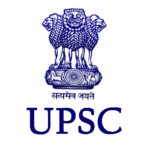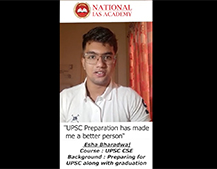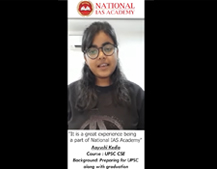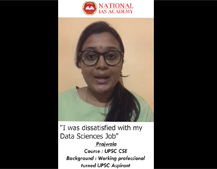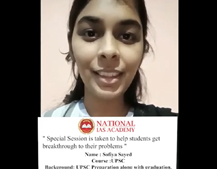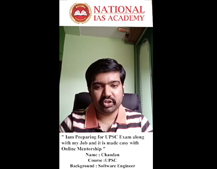Best IAS Coaching in Bangalore
National IAS Academy is the one of the best IAS Coaching in Bangalore that promises best outcomes for all aspiring candidates enrolled with them. The National IAS Academy is a coaching institute with a difference; fortified with highly experienced and expert tutors in the arena of Civil Services examination and a continuous assessment module. National IAS Academy is considered as a very reputed IAS academy in Bangalore.
The National IAS Academy is a prolific and dynamic institution that has kept up with the changing examination scenarios of India’s toughest exam. The Academy inculcates passion and a sense of serving India for its development and bettering the lives of the Indian citizens in each of its candidates. The National IAS Academy aims to train the highest number of IAS candidates serving the nation.
The National IAS Academy offers quality education, teaching material and mentoring to its studies. It offers a balance of online as well as in-class learning sessions while doubt clearing assistance and guidance is available round the clock. The National IAS Academy is one of the top ranking IAS academy in Bangalore.

Why National IAS Coaching in Bangalore?

Interactive Learning
Added advantage of visiting guest lectures delivered by officers belonging to IAS, IPS, IFS, IRS, IRTS and other cadre.
Best Infrastructure
A well balanced study experience using online study materials and physical classroom
Best Facilities
Lucid and student friendly study material
Shaping Personality
24×7 student assistance
Remarkable Teaching
Study room with ample and suitable study material
Best Coaching
Study oriented and competitive atmosphere
Our Courses
About Our Academy
National IAS Academy Training Protocol
The Training Protocol devised by the National IAS Academy is extensive and exhaustive. Great deal of efforts are involved in developing various courses and study material.
Clarity in communication is the key to ensure right delivery of vision and its real-time implementation as required by a IAS officer or Civil Service officer. The National IAS Academy gives special attention to develop to speaking skills of each and every candidate.
The students are guided across all subjects including public administration, general studies, sociology and so on using time tried methodologies and practice modules.
Active Student Teacher Interaction
National IAS Academy encourages Active Student Teacher Interaction to ensure that the concepts are clear and well understood. It encourages discussions, and exchange of perspectives which ensure that the concepts are well ingrained in the candidate’s minds.
Personality Development
Candidates receive all round training while studying for IAS examination at National IAS Academy, Bangalore. We ensure that they develop good leadership, reasoning and administrative qualities as they are the emerging office bearers of India.
Dedicated Teaching Force
Recognised as the best IAS coaching centre in Bangalore, the National IAS Academy has in place a team of expert and dedicated teaching faculty who are well versed with the latest trends in the IAS examination. They take efforts to teach and mentor the candidates for success and selection as IAS officers.
State of art Infrastructure
National IAS Academy has invested in best digital and physical infrastructure to ensure provision of all requisite facilities and which are useful to the candidates.
Recognition Awards for excellence in coaching
The National IAS Academy has received the “Prime Time” & “Excellence in Indian Education” Awards which recognize its efforts and dedication in providing excellent coaching to aspiring IAS candidates.
FAQs
- Candidates belonging to General category and OBC (creamy layer) must have attained the age of 21 on 1st August of the year of the Exam but must not have attained the age of 32 on 1st August of the year of the Exam.
- Candidates belonging to OBC (non creamy layer) category must have attained the age of 21 on 1st August of the year of the Exam but must not have attained the age of 35 on 1st August of the year of the Exam.
- Candidates belonging to SC category must have attained the age of 21 on 1st August of the year of the Exam but must not have attained the age of 37 on 1st August of the year of the Exam. Candidates belonging to ST category must have attained the age of 21 on 1st August of the year of the Exam but must not have attained the age of 37 on 1st August of the year of the Exam.
It is difficult to provide a specific success rate for candidates who attend UPSC coaching classes as there are many factors that can influence success in the UPSC exam.
The National IAS Academy can certainly provide valuable guidance and support to candidates by helping them understand the exam pattern, providing study materials, and offering personalized feedback on their performance. However, success in the exam also depends on factors such as the candidate's personal motivation, dedication, and hard work, as well as their ability to understand and apply the knowledge and skills required for the exam.
Additionally, there are many candidates who clear the UPSC exam without attending coaching classes, relying solely on self-study or other resources such as online materials, books, and study groups.
Therefore, while coaching classes can be a helpful resource for candidates preparing for the UPSC exam, success ultimately depends on a combination of factors and cannot be attributed solely to attending coaching classes.
The best way to stay updated on changes in the IAS (Indian Administrative Service) syllabus is to regularly visit the official website of the Union Public Service Commission (UPSC), which is the body responsible for conducting the IAS exam. The UPSC website provides the latest updates on the IAS exam, including any changes in the syllabus.
You can also subscribe to the UPSC newsletter or follow their social media accounts. Also follow National IAS academy trick to cover the syllabus , as they often post updates and notifications regarding changes in the syllabus. Additionally, you can join online forums and communities dedicated to IAS exam preparation, where aspirants share information and discuss the latest updates.
It is important to stay informed about any changes in the IAS syllabus, as this will help you plan your preparation strategy accordingly and ensure that you cover all the necessary topics and subjects.
General Studies is a crucial component of the Civil Services Examination, which is required for becoming an Indian Administrative Service (IAS) officer. It encompasses a broad range of subjects and topics that are essential for an aspiring IAS officer to be well-informed about, including history, geography, economics, science and technology, environment, and current affairs.
General Studies is important in IAS preparation because it tests the candidate's overall awareness and understanding of various issues that are relevant to the country and its citizens. It helps in developing the intellectual and analytical abilities of the candidate, and also helps them to build a holistic perspective on a variety of topics.
The General Studies paper in the Prelims exam is a screening test that helps the UPSC to filter out candidates who lack the basic knowledge and understanding required to be an IAS officer. In the Mains exam, General Studies is a major component of the syllabus, and its marks are critical in determining the final rank of the candidate.
Furthermore, the knowledge and skills gained from studying General Studies are also relevant to the job of an IAS officer, who must be knowledgeable about a variety of issues in order to effectively perform their duties and serve the people of the country.
Overall, General Studies plays a vital role in IAS preparation, and candidates should focus on building a strong foundation in this subject in order to succeed in the Civil Services Examination.
The essay writing section of the IAS exam is an important component that tests a candidate's ability to express their ideas, arguments, and viewpoints in a structured and coherent manner. Here are some tips on how to prepare for the essay writing section:
- Improve your language skills: Having a strong command over the English language is essential for writing a good essay. You should read extensively and work on improving your vocabulary, grammar, and syntax.
- Practice writing essays: Practice writing essays on a variety of topics to get comfortable with the format and style. Make sure you stick to the word limit and use a clear and concise writing style.
- Understand the format and structure: The essay should have a clear introduction, body, and conclusion. The introduction should provide an overview of the topic, the body should present arguments and examples, and the conclusion should summarize the main points.
- Analyze previous year's questions: Analyze the previous year's essay questions to get an idea of the kind of topics that are asked. This will help you understand the demand of the question and prepare accordingly.
- Keep it concise and to the point: Avoid beating around the bush and stick to the topic. Make sure your arguments are clear and concise and directly address the topic.
- Develop a balanced perspective: An IAS essay should reflect a balanced perspective on the topic. This means that you should present arguments for and against the topic and give your opinion only in the conclusion.
- Practice time management: Make sure you manage your time well during the exam. Allocate time for planning, writing, and revising your essay.
- Seek feedback: Practice writing essays and seek feedback from your peers, mentors, or teachers. This will help you improve your writing skills and gain confidence in your abilities .
Remember, essay writing is a skill that can be developed with practice and perseverance. By following these tips and putting in the required effort, you can improve your essay writing skills and perform well in the IAS exam.


